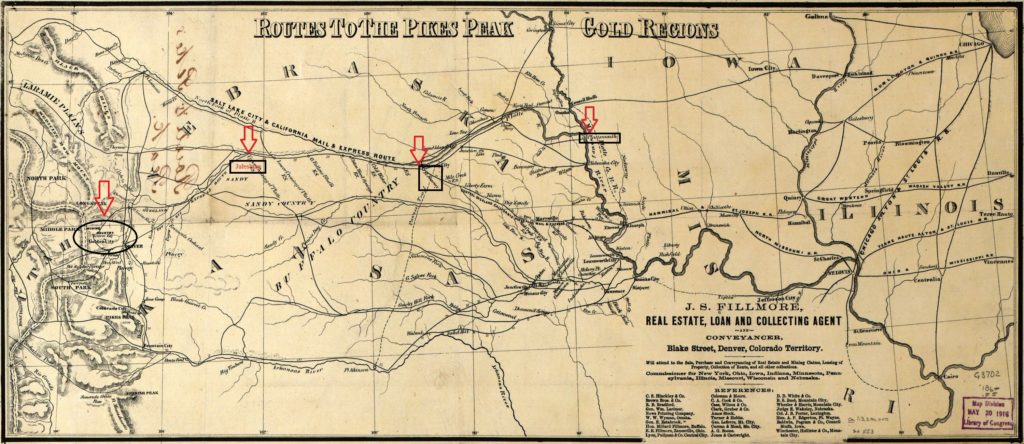A Pioneer Story: Pioneer Days, Part 6, Into the Colorado Mountains

In July they were approached by a party of Indians who camped in their yard. Laura, who had a fear of being scalped, was not happy but J.W. took the position that they were peaceful and only needed a good place to camp and rest for a few days. This they did and then left on their trek to the mountains. As Laura reported: “I could never quite rid myself of the idea that Indians were not the most desirable people to have around.”
J.W., meantime, was seeking information about the mining being done from everyone he could talk with. As it happened, they were visited by a stranger looking for a drink of water, who had just come from the mountains. His two sons were mining on Clear Creek and he was going to return to them in a few days. While he was conducting his business in Denver the Booths discussed going to the mountains to spend the winter. Although there were numerous horrible things or hardships which might occur, J.W. wanted to try if Laura was willing. Plans were therefore made with their new friend, Mr. Roberts, to accompany him. The Booths sent for their teams from the ranch where they had been staying since the trip West, and the wagons loaded. On a cool October morning they started out.
Three or four days of travel brought them within a day’s drive of their destination as the roads became increasingly precipitous and Laura found them “too frightful to think of riding over…we often take occasion to stop the wagon and alight preferring to walk over such roads.” The last day with 6 miles still to travel, Laura and the children, who had been persuaded to ride the rest of the way, panicked at a “rickety looking bridge over a deep canon” that had no side supports and she insisted on stopping the wagon and getting out to walk across. As it turned out, the driver of their wagon failed to make a turn in the road and the wagon went over a 6 foot embankment and landed upside down. J.W. hadn’t been aware that his family had gotten out to walk and feared the loss of his wife and children, crushed beneath the wagon. He was mightily relieved to discover that they were safe.
They left the wagon to retrieve another day and went on to Mr. Roberts’ cabin where they would share his hospitality until they could build a place of their own. The area was called the Spanish Bar, a small mining community which boasted a log house hotel and half a dozen miner’s cabins. The miner’s cabin was about 12 by 14 feet, with a “huge black log used as a foundation for the structure” which was stepped over to enter. There were two bunks along one side of the room, a few wooden stools, a rough table, and an improvised cupboard made of boxes for the cooking utensils. They brought in clean pine boughs for mattresses on the bunks and their bedding from the wagon and were comfortable for the night.
After a day’s rest, the other wagon was retrieved and they set about adding to the cabin’s comforts. They had filled the box of the wagon bed with all manner of household goods and found material for covering the cabin walls, a mirror, some bric-a-brac, a few pictures. Laura sewed a floor covering of gunny sacks that was fastened over the dirt floor with wooden pins. There was even a cook stove (which had survived the overturned wagon) and was set in one corner giving them a kitchen. Their neighbor across the way called it luxurious and “too cozy for anything”. It was quite a transformation of the cabin.
During the ensuing winter they accumulated certificates on claims to be developed in the spring, and J.W. proceeded “to erect a home for us in a beautiful spot on the sunny slope of the mountain.” Their belated mail and news caught up with them finally, and the big news was the election of Abraham Lincoln as president.
“Lincoln! Lincoln! Who is he? Must be a dark horse. He was not the regular nominee of the Republican party. Later the news is confirmed. There can be no mistake now and Abraham Lincoln, the Rail Splitter of Illinois is to be our next president. Next come mutterings of discontent. Our united country shows signs of disruption. The South is dissatisfied and who can tell what the outcome will be? We await developments and in the meantime proceed with our building operations in this mountain county, far away from the scenes of the political struggle.”

Leave a Reply